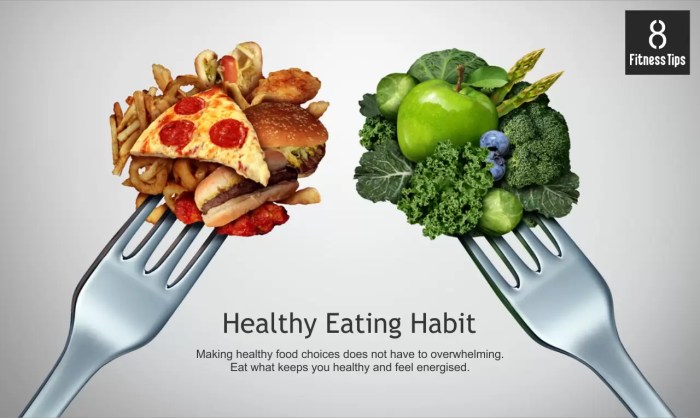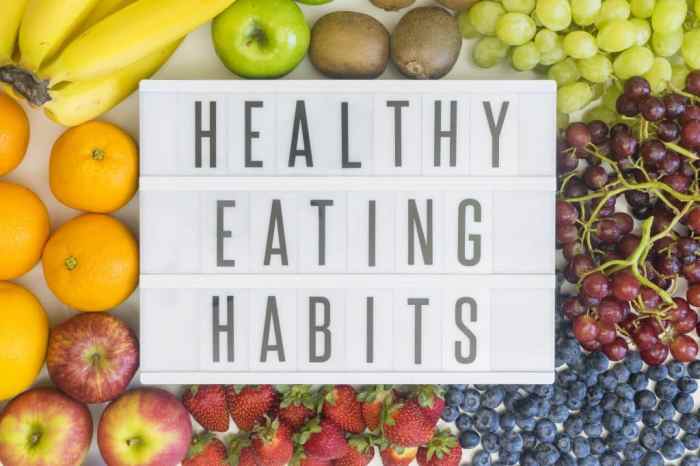Healthy Eating Habits set the stage for a vibrant life. Dive into the world of nutritious choices, delicious meals, and energizing foods that will revolutionize your well-being.
Uncover the secrets to a balanced diet, the impact of food on your physical and mental health, and the strategies to build a sustainable relationship with what you eat. Get ready to transform your habits and transform your life with Healthy Eating Habits.
Benefits of Healthy Eating Habits

Eating healthy plays a crucial role in improving overall well-being. By incorporating nutritious foods into your diet, you can experience a wide range of benefits that positively impact both your physical and mental health.
Essential Nutrients for a Balanced Diet
Maintaining a balanced diet involves consuming a variety of essential nutrients that support optimal body function. Some key nutrients include:
- Protein: Essential for muscle growth and repair.
- Fiber: Aids in digestion and helps maintain a healthy weight.
- Vitamins and minerals: Support various bodily functions and overall health.
- Healthy fats: Provide energy and support cell function.
Impact on Physical Health
Healthy eating habits can have a significant impact on physical health by:
- Reducing the risk of chronic diseases such as heart disease, diabetes, and obesity.
- Boosting the immune system to help fight off infections and illnesses.
- Promoting healthy weight management and supporting overall fitness levels.
Improving Mental Clarity and Energy Levels
Consuming a nutrient-rich diet can also enhance mental clarity and energy levels by:
- Providing the brain with essential nutrients for optimal cognitive function.
- Stabilizing blood sugar levels to prevent energy crashes and improve focus.
- Promoting better sleep quality, which is essential for overall mental well-being.
Building Healthy Eating Habits

Eating healthy is not just about what you eat, but also how you plan your meals and make conscious choices every day. Here are some strategies to help you build healthy eating habits.
Meal Planning for Healthy Eating
Planning your meals in advance can make a big difference in maintaining a healthy diet. Here are some tips to help you get started:
- Make a weekly meal plan: Take some time each week to plan out your meals and snacks. This can help you make healthier choices and avoid last-minute unhealthy options.
- Prepare meals in advance: Consider cooking larger portions and storing leftovers for future meals. This can save you time and ensure that you always have a healthy option available.
- Include a variety of foods: Aim to include a mix of fruits, vegetables, whole grains, lean proteins, and healthy fats in your meals to ensure you’re getting a balance of nutrients.
Incorporating More Fruits and Vegetables
Fruits and vegetables are essential for a healthy diet, but it can be challenging to eat enough of them every day. Here are some tips to help you incorporate more fruits and vegetables into your meals:
- Start small: Add a serving of fruit or vegetables to each meal to gradually increase your intake.
- Snack on fruits and vegetables: Keep cut-up fruits and veggies on hand for easy snacking throughout the day.
- Add them to recipes: Incorporate fruits and vegetables into your favorite dishes, like adding spinach to a pasta sauce or fruit to a salad.
Portion Control and Mindful Eating
Portion control is key to maintaining a healthy weight and preventing overeating. Here are some tips for practicing portion control and mindful eating:
- Use smaller plates: Opt for smaller plates to help control portion sizes and prevent overeating.
- Listen to your body: Pay attention to your hunger and fullness cues to avoid eating more than you need.
- Eat slowly: Take your time to savor your food and enjoy the flavors, which can help prevent overeating.
Making Healthier Choices Eating Out
Eating out or ordering takeout doesn’t have to derail your healthy eating habits. Here are some tips for making healthier choices when dining out:
- Look for healthier options: Choose grilled or steamed dishes instead of fried, and opt for salads or vegetable-based dishes.
- Control your portions: Consider sharing a meal with a friend or taking half of your meal home for later.
- Ask for modifications: Don’t be afraid to ask for dressings or sauces on the side, or for substitutions to make your meal healthier.
Common Misconceptions about Healthy Eating
There are several myths surrounding healthy eating habits that can be misleading. It’s important to debunk these misconceptions to promote better understanding of what truly constitutes a healthy diet.
Myth: Fad diets are the key to quick and long-lasting weight loss.
Many people believe that following fad diets, which often involve extreme restrictions or cutting out entire food groups, is the best way to lose weight. However, these diets are not sustainable in the long run and can lead to nutrient deficiencies, muscle loss, and even weight gain in the future.
Importance of Variety in Food Choices
It’s crucial to include a variety of foods in your diet to ensure you are getting all the essential nutrients your body needs. A balanced diet should consist of different food groups such as fruits, vegetables, whole grains, lean proteins, and healthy fats.
Dangers of Restrictive Eating Patterns and Crash Diets
Restrictive eating patterns, such as severely limiting calories or cutting out entire food groups, can have serious health consequences. Crash diets, which promise rapid weight loss through extreme measures, can lead to metabolic damage, nutritional deficiencies, and even eating disorders.
Impact of Healthy Eating on Specific Health Conditions: Healthy Eating Habits
Eating a healthy diet can have a significant impact on various health conditions by providing essential nutrients and supporting overall well-being.
Preventing Chronic Diseases, Healthy Eating Habits
Healthy eating habits can help prevent chronic diseases such as heart disease and diabetes by reducing risk factors like high blood pressure, high cholesterol, and obesity. A diet rich in fruits, vegetables, whole grains, lean protein, and healthy fats can support heart health and regulate blood sugar levels.
Managing High Blood Pressure and Cholesterol
Nutrition plays a crucial role in managing conditions like high blood pressure and cholesterol. Foods low in sodium, saturated fats, and trans fats can help maintain healthy blood pressure levels and improve cholesterol profiles. Incorporating foods high in fiber, omega-3 fatty acids, and antioxidants can also support heart health.
Boosting Immunity and Fighting Inflammation
Certain foods can help boost immunity and fight inflammation in the body. Foods rich in vitamin C, vitamin E, zinc, and antioxidants can strengthen the immune system and reduce inflammation, potentially lowering the risk of chronic diseases and infections.
Tailoring Diet to Specific Health Needs
Individuals with specific health needs or dietary restrictions can benefit from customizing their diet accordingly. For example, people with diabetes may need to monitor their carbohydrate intake, while individuals with celiac disease should avoid gluten-containing foods. Consulting with a healthcare provider or a registered dietitian can help tailor a diet plan to meet specific health requirements.
